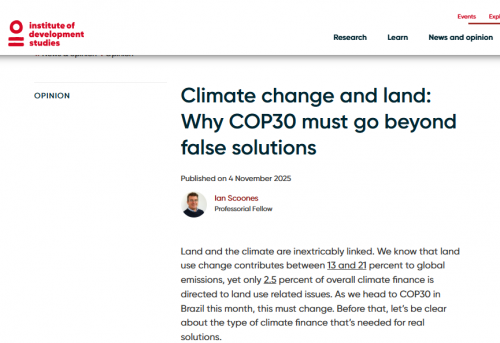
https://www.ids.ac.uk/opinions/climate-change-and-land-why-cop30-must-go...
Land and the climate are inextricably linked. We know that land use change contributes between 13 and 21 percent to global emissions, yet only 2.5 percent of overall climate finance is directed to land use related issues. As we head to COP30 in Brazil this month, this must change. Before that, let’s be clear about the type of climate finance that’s needed for real solutions.
The relationships between climate change and land issues are complex. If we are to direct financing appropriately, these connections must be unravelled. As we argue in our open access book, Climate Change and Agrarian Studies, this requires a sharp focus on the capitalist relations that cause climate change in the first place and in turn affect how land is used and how people on the land experience climate change.
Interconnections between climate change and land: four themes
Four themes connecting climate change and land can be highlighted:
- Climate impacts depend on the type of land use, and the capitalist relations that they entail. Land uses with the greatest impacts on the climate – fossil fuel dependent industrial agriculture, extractive forestry and contained, intensive meat production – must be the focus of climate mitigation policy efforts. Reducing climate impacts means changing agriculture, forestry and water use in radical ways that challenge dominant forms of production, and with these some powerful, entrenched interests in agri-food systems.
- Alternative land uses that are centred on more localised, indigenous systems of land use – small-scale agriculture, mobile pastoralism, forest gathering, swidden systems and so on – have much lower climate impacts, with fewer emissions, as we discussed recently for pastoral systems as part of the IDS-led PASTRES programme. They also crucially support more livelihoods and are able to adapt to shifts in the climate. Support for such sustainable forms of agriculture and land use must be a priority for COP30.
- So-called ‘climate solutions’ such as carbon forestry offset projects, renewable energy infrastructure investments and so on may actually undermine these sustainable uses of landscapes, displacing and marginalising people in the process. Climate solutions imagined outside local contexts as part of ‘net-zero’ options can be the cause of displacement and ‘green grabbing’. Such projects can have negative impacts on local livelihoods and adaptation possibilities. Forest carbon offset projects, for example, have been shown again and again to have limited or sometimes negative ‘additionality’, with no ‘net-zero’ gains to speak of. For a recent systematic review, see here, which echoes our IDS work on carbon forestry in Africa from a decade ago.
- The possibilities of adaptation to climate shocks by poor and marginalised peoples across the world are affected by long-term structural impacts that limit access to land by class, gender, race and ethnicity. Long histories of colonial oppression have generated vulnerabilities that are not easily addressed by simple ‘adaptation’ or ‘resilience building’ projects. Sticking plaster solutions that do not seek to reverse the structural conditions that create differential climate impacts will fail to address the real problems.
A call from Cape Town to COP30 and beyond
As was discussed at the recent Conference on Land, Life and Society and as reflected in the Cape Town Declaration that emerged from discussions among 250 participants from 53 countries, redistributive land reforms need to be seen as part of climate policy and central to climate solutions. Changing how land is used and by whom means moving towards more regenerative forms of agriculture where territorial forms of production and exchange can be facilitated.
The Cape Town Declaration offered two powerful resolutions in relation to climate and environmental change:
- Addressing climate and wider environmental change must be central to agrarian reform and rural development. Land, water, and the climate are intimately intertwined. Land use change may be both, the cause of climate change and the solution. Reducing fossil fuel-dependent production is crucial. Large-scale agribusiness dependent on high inputs and linked to global systems of trade is particularly damaging. By contrast, the use of land for sustainable, agroecological systems, controlled by people operating within local economic networks, offers opportunities for both climate mitigation and adaptation.
- Externally-imposed climate solutions aimed at meeting net zero targets – such as carbon offset projects or renewable energy projects – are often undermining livelihoods and destroying land systems in the Global South. Such forms of ‘green extractivism’ should be rejected in favour of alternative climate responses, centred on locally-led, sustainable use of land and resources.
COP30 must grasp these challenges, linking the concerns around agrarian reform and rural development of ICARRD+20 (the international conference on agrarian reform and rural development) to be held in Cartegena in early 2026 with the imperative of addressing the climate emergency. For COP30, this means a big switch in direction for climate policy and financing, grounding solutions with people on the land.









